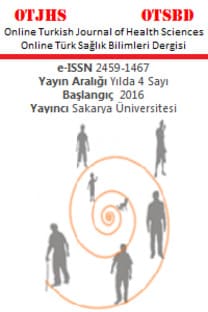Hemşirelerin Sosyodemografik Özelliklerine Göre Uyku Hijyeninin Değerlendirilmesi
Değerlendirme, hemşireler, sosyodemografik özellikler, uyku hijyeni
Evaluation of Sleep Hygiene According to the Sociodemographic Characteristics of the Nurses
Assessment, nurses, sociodemographic characteristics, sleep hygiene,
___
- Fekedulegn D, Andrew ME, Shi M, Violanti JM, Knox S, Innes KE. Actigraphy-based assessment of sleep parameters. Annals of Work Exposures and Health. 2020;64(4):350-367. doi:10.1093/annweh/wxaa007
- Karaaslan Y, Mete O, Karadag M, Kaya DO, Celenay ST. An investigation of potential coronaphobia-related factors in adults and sleep quality relations. Sleep Medicine. 2021;84(6):356-361.
- Lukowski AF, Milojevich HM. Sleep problems and temperament in young children with down syndrome and typically developing controls. Journal of Intellectual Disability Research. 2016;61(3):222. doi:10.1111/jir.12321
- Knufinke M, Nieuwenhuys A, Geurts SA, Coenen AM, Kompier MA. Self‐reported sleep quantity, quality and sleep hygiene in elite athletes. Journal of Sleep Research. 2018;27(1):78-85. doi:10.1111/jsr.12509
- Peach HD, Gaultney JF, Ruggiero AR. Direct and indirect associations of sleep knowledge and attitudes with objective and subjective sleep duration and quality via sleep hygiene. The Journal of Primary Prevention. 2018;39(4):555-570.
- Al-Kandari S, Alsalem A, Al-Mutairi S, Al-Lumai D, Dawoud A, Moussa M. Association between sleep hygiene awareness and practice with sleep quality among Kuwait University students. Sleep Health. 2017;3:342-347.
- Pérez-Fuentes MDC, Molero Jurado MDM, Simón Márquez MDM, Gázquez Linares JJ. Analysis of sociodemographic and psychological variables involved in sleep quality in nurses. International Journal of Environmental Research and Public Health. 2019;16(20):1-14.
- Sheng X, Liu F, Zhou J, Liao R. Psychological status and sleep quality of nursing interns during the outbreak of COVID-19. Journal of Southern Medical University. 2020;40(3):346-350.
- Dai C, Qiu H, Huang Q, et.al. The effect of night shift on sleep quality and depressive symptoms among Chinese nurses. Neuropsychiatric Disease and Treatment. 2019;15(5):435-440.
- Silva RMD, Lenz FCD., Schlotfeldt NF, et.al. Sleep assessment and assocıated factors in hospıtal nursıng workers. Texto & Contexto-Enfermagem. 2023;51(1):1-13.
- Braley TJ, Shieu MM, Zaheed AB, Dunietz GL. Pathways between multiple sclerosis, sleep disorders, and cognitive function: longitudinal findings from the nurses’ health study. Multiple Sclerosis Journal. 2023;29(3):21-42. doi.org/10.1177/13524585221144.
- Simonett, V, Durante A, Ambrosca R, et al. Anxiety, sleep disorders and self‐efficacy among nurses during COVID‐19 pandemic: a large cross‐sectional study. Journal of Clinical Nursing. 2021;30(9-10):1360-1371.
- Güzel Özdemir PG, Boysan M, Selvi Y, Yildirim A, Yilmaz E. Psychometric properties of the Turkish version of the sleep hygiene index in clinical and non-clinical samples. Comprehensive Psychiatry. 2015;59:135-140. doi:10.1016/j.comppsych.2015.02.001
- Jeong JY, Gu MO. The influence of stress response, physical activity, and sleep hygiene on sleep quality of shift work nurses. Journal of the Korea Academia-Industrial Cooperation Society. 2016;17(6):546-559. doi:10.4040/jkan.19238
- Sun Q, Ji X, Zhou W, Liu J. Sleep problems in shift nurses: a brief review and recommendations at both individual and institutional levels. Journal of Nursing Management. 2019;27(1):10-18. doi:10.1111/jonm.12656
- Faraklas I, Holt B, Tran S, Lin H, Saffle J. Cochran, A. Impact of a nursing-driven sleep hygiene protocol on sleep quality. Journal of Burn Care & Research. 2013;34(2):249-254. doi:10.1097/BCR.0b013e318283d175
- Park E, Lee HY, Park CSY. Association between sleep quality and nurse productivity among Korean clinical nurses. J Nurs Manag. 2018;26(8):1–8. doi:10.1111/jonm.12634
- Karakaş SA, Gönültaş N, Okanli, A. Sleep quality in shift working nurses. Journal of ERU Faculty of Health Sciences. 2017;4(1):17-26.
- Çetinol T, Özvurmaz S. Sleep quality and related factors in nurses. Medical Sciences. 2018;13(4):80-89. doi.dx.doi.org/10.12739.
- Ferri P, Guadi M, Marcheselli L, Balduzzi S, Magnani D, DiLorenzo R. The impact of shift work on the psychological and physical health of nurses in a general hospital: a comparison between rotating night shifts and day shifts. Risk Management Health Policy. 2016;9(4):203-211.
- Kaçan CY, Örsal Ö, Köşgeroğlu N. Nurses examination of sleep quality. Journal of Anatolia Nursing and Health Sciences. 2016;19(4):145-53.
- Şentürk S. Burnout of intensive care nurses relationship between sleep levels and sleep quality examination. Bozok Medical Journal. 2014;4(2):48-56.
- Toros E. The effect of long working hours on nurses' attention, fatigue and sleep quality. Trakya University Institute of Health Sciences, Master's Thesis. Edirne, Türkiye. 2021.
- Giorgi F, Mattei A, Notarnicola I, Petrucci C, Lancia L. Can sleep quality and burnout affect the job performance of shift‐work nurses? A hospital cross‐sectional study. Journal of Advanced Nursing. 2018;74(3):698-708. doi:10.1111/jan.13484
- Tang Z, Li X, Zhang Y, et al. Psychometric analysis of a Chinese version of the sleep hygiene index in nursing students in China: a cross-sectional study. Sleep Medicine. 2021;81:253-260. doi:10.1016/j.sleep.2021.02.050
- Bigand, T, Dakup PP, Hansen D, et al. Relationships between cortisol, sleep, stress, and mood among night shift nurses. Providence Nurse Research Conference. 28 May 2021, Washington/USA.
- Huang, Q, Tian C, Zeng, XT. Poor sleep quality in nurses working or having worked night shifts: a cross-sectional study. Frontiers in Neuroscience. 2021;15(3):1-10. doi:10.3389/fnins.2021.638973
- ISSN: 2459-1467
- Yayın Aralığı: Yılda 4 Sayı
- Başlangıç: 2016
- Yayıncı: Oğuz KARABAY
Zehra BAŞAR KOCAGÖZ, Enes SARIGEDİK, Burcu SARIGEDİK
Hemşirelerin Sosyodemografik Özelliklerine Göre Uyku Hijyeninin Değerlendirilmesi
Çiğdem Müge HAYLI, Gülendam HAKVERDİOĞLU YÖNT, Dilek DEMİR KÖSEM
Havayolu Yönetiminde I-Gel ile Auragain Kullanımının Karşılaştırılması
Göksel EDE, Özlem DELİGÖZ, Sefa GÖKDEN, Osman EKİNCİ
Ebeveynin Okupasyonel Dengesi ve Çocuk-Ebeveyn İlişkisi
Esma ÖZKAN, Serkan PEKÇETİN, Rüya Gül TEMEL
COVID-19 Pandemisinde Gebelikten Doğum Sonrasına Ruh Sağlığı: Boylamsal Bir Çalışma
Sidika Özlem CENGİZHAN, Esra GÜNEY, Esra SABANCI BARANSEL, Esra KARATAŞ OKYAY, Tuba UÇAR
Aile Hekimlerinin İş Doyumu Düzeyini Etkileyen Faktörler ve Mesleki Benlik Saygısı İle İlişkisi
Rabia ÖZTAŞ KARA, Bahar SEVİMLİ DİKİCİER, Ahmet Can YAĞMUR, Ahmet KARA, Mahizer YALDIZ
Tuba İNCE PARPUCU, Candan ALGUN, Uğur TOPRAK, Sefa TÜRKOĞLU
Oral Antikoagülan Kullanan Covid-19 Hastalarının Hastane İçi Klinik Sonuçları
